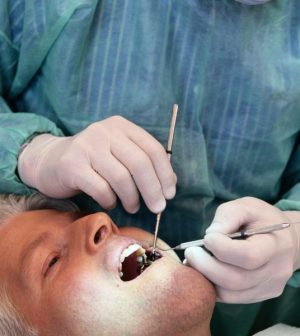- Could Your Grocery Store Meat Be Causing Recurring UTIs?
- Are You Making This Expensive Thermostat Error This Winter?
- Recognizing the Signs of Hypothyroidism
- 10 Strategies to Overcome Insomnia
- Could Artificial Sweeteners Be Aging the Brain Faster?
- Techniques for Soothing Your Nervous System
- Does the Water in Your House Smell Funny? Here’s Why
- Can a Daily Dose of Apple Cider Vinegar Actually Aid Weight Loss?
- 6 Health Beverages That Can Actually Spike Your Blood Sugar
- Treatment Options for Social Anxiety Disorder
Can Treating Gum Disease Keep Blood Pressure in Line?

Aggressively treating gum disease may help lower blood pressure in people at high risk for high blood pressure, according to new research.
The study involved 107 Chinese women and men, aged 18 and older, who had pre-hypertension (blood pressure on the high end of normal) and moderate to severe gum disease. Half received intensive treatment for gum disease, and half received standard treatment.
Standard treatment included basic oral hygiene instructions and teeth cleaning with plaque removal above the gum line. Intensive treatment included standard treatment as well as cleaning down to the roots of teeth, antibiotic treatment and removal of teeth, if necessary.
One month after their gum disease treatment, systolic blood pressure (the top number in a reading) was 3 points lower in the intensive treatment group than in the standard treatment group. There was no difference in diastolic blood pressure (the bottom number), the study findings showed.
Three months after treatment, systolic blood pressure was nearly 8 points lower and diastolic pressure was nearly 4 points lower in the intensive treatment group. Six months after treatment, systolic blood pressure was nearly 13 points and diastolic blood pressure was almost 10 points lower in the intensive treatment group.
The findings were scheduled for presentation Tuesday at the annual meeting of the American Heart Association (AHA), in Anaheim, Calif.
“The present study demonstrates for the first time that intensive periodontal intervention alone can reduce blood pressure levels, inhibit inflammation and improve endothelial function,” lead author Dr. Jun Tao said in an AHA news release. Tao is chief of the department of hypertension and vascular disease at the First Affiliated Hospital of Sun Yat-sen University in Guangzhou, China.
About one of every three adults in the United States — nearly 75 million people — has high blood pressure, according to the U.S. Centers for Disease Control and Prevention. High blood pressure is a major risk factor for heart attack and stroke.
Research presented at meetings should be considered preliminary until it has been published in a peer-reviewed journal.
More information
The U.S. Centers for Disease Control and Prevention has more on preventing high blood pressure.
Source: HealthDay
Copyright © 2026 HealthDay. All rights reserved.










